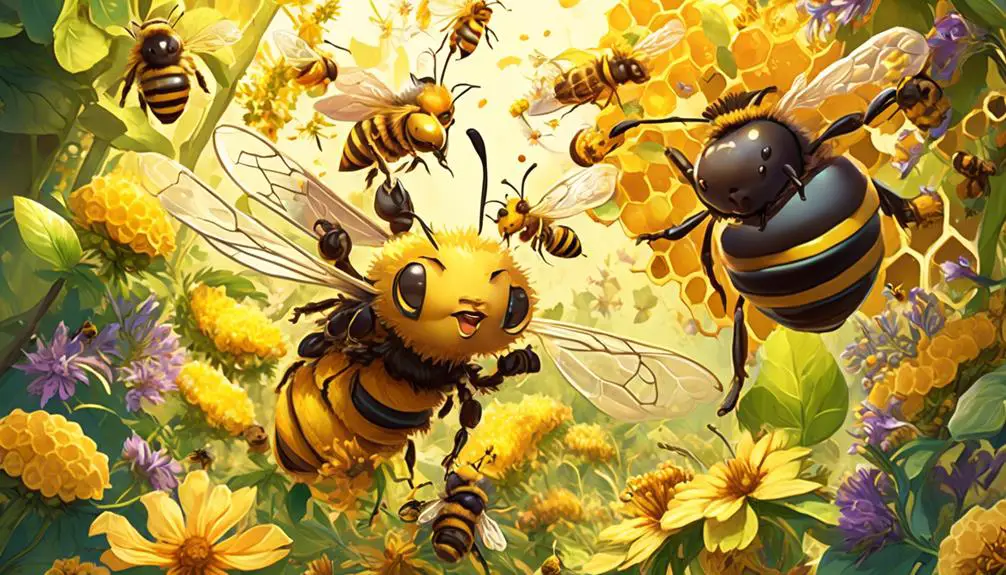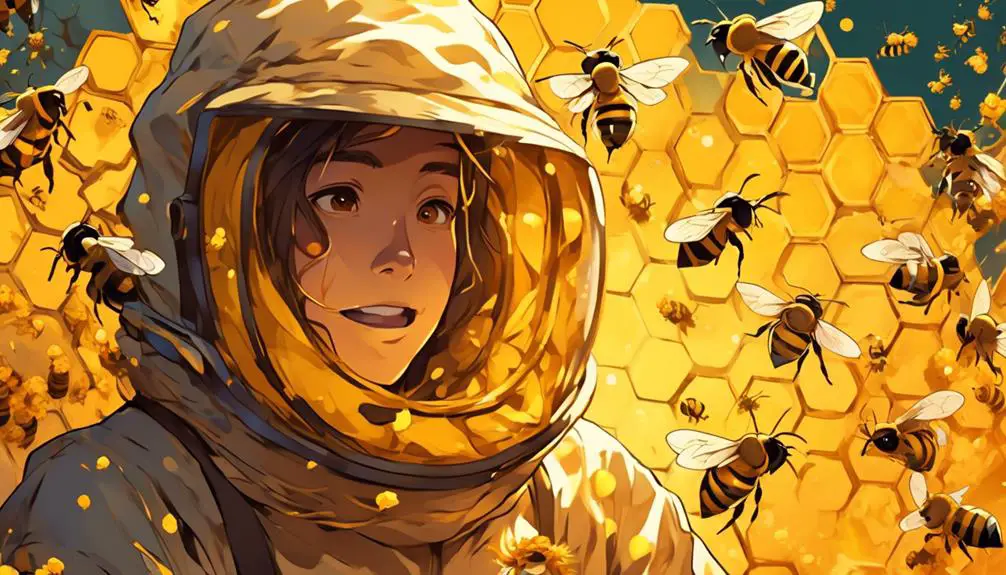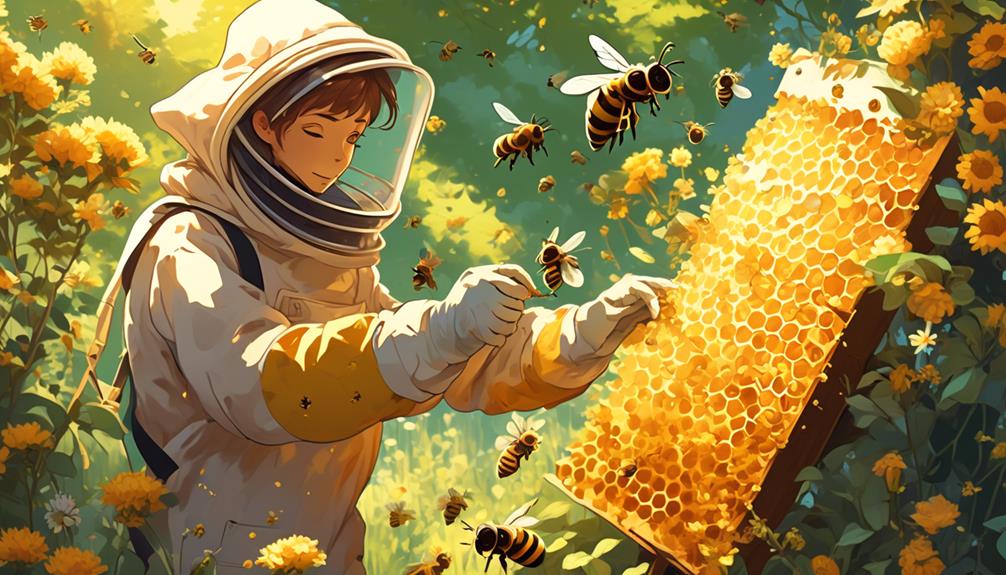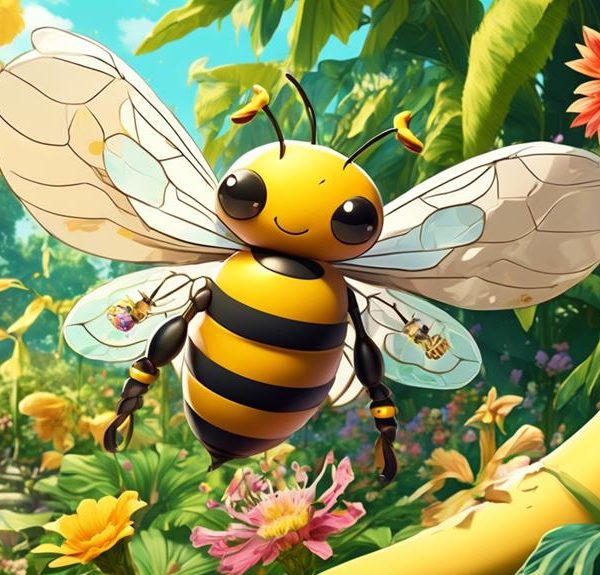Just how much do bees understand human speech?' Uncover the surprising relationship between our voices and the buzzing world of bees.

Do Bees Like Be Talked to Humans
'Actions speak louder than words,' as the old adage goes, but when it comes to the fascinating world of bees, could the opposite be true? You're probably aware of the vital role these buzzing creatures play in our ecosystem, but have you ever considered the impact of your voice on them?
There's been a lot of buzz around whether bees respond to human voices, and if so, how. Researchers have been delving into the intricate communication systems of bees, attempting to decode the language of their dance, but it's also worth exploring whether our language could possibly resonate with them.
Stick around, you might just be surprised at what we've discovered.
Key Takeaways
- Bees can sense human voices through sound vibrations.
- High-frequency sounds can disturb bees and cause stress.
- Soft sounds, like whispering, may have a calming effect on bees.
- Bee behavior is influenced by individual experiences and not solely instinctive.
Understanding Bee Communication

To truly grasp how bees interact with humans, it's crucial to first understand their unique methods of communication. You might be surprised to learn that bees converse through dance. Yes, dance! It's called the Waggle Dance and it's a fascinating process. A bee that has located a good food source will return to the hive and perform a series of movements that indicate the direction and distance of the food source. Other bees observe this dance and then fly off in the right direction.
They also communicate through pheromones. These are chemical signals that bees release to alert others in the hive about different situations. For instance, if a bee stings an intruder, it releases a pheromone that signals the other bees to attack.
Understanding this complex communication system can help you better appreciate the interaction between bees and humans. Next time you see a bee, remember that it's part of a sophisticated network that communicates through dance and chemicals. You're witnessing a species that has developed intricate ways of sharing vital information. It's a remarkable sight to behold.
Human Speech: Can Bees Comprehend?

You may be wondering if bees can understand human speech, a question that has intrigued scientists and bee enthusiasts alike for years. The answer, however, isn't as simple as you might think.
While bees can't comprehend human language in the way that we do, they're sensitive to certain sound vibrations. Research has shown that bees respond to the vibrations created by sound waves, including those produced by human speech. This doesn't mean they understand the words you're saying, but rather they can sense the physical impact of the sounds you make.
Furthermore, bees are more tuned into the visual and chemical signals around them. They communicate using a combination of movements, pheromones, and even taste. So, while you're more likely to get a reaction from a bee by moving or releasing a scent, your words won't fall on deaf antennas.
The Impact of Human Voices on Bees

While bees may not understand the words we speak, it's interesting to explore how human voices, as a source of sound vibrations, might affect these fascinating creatures. You see, bees are sensitive to their environment, and changes, such as a new sound, can influence their behavior.
Now, think about your voice. It's not just a tool for communication but also an array of vibrations. These vibrations can travel through the air, and if a bee is in their path, they can perceive them. It's like you're sending messages, but in a language they're still learning.
Here's a table that summarizes some studies and their findings on this topic:
Study | Finding | Implication |
|---|---|---|
A | Bees respond to sound vibrations | Bees can detect human voices |
B | High-frequency sounds disturb bees | Loud voices might stress bees |
C | Soft sounds can calm bees | Whispering could be beneficial |
These studies suggest that your voice can have an impact on bees. But remember, more research is needed. So, the next time you're near a beehive, consider the possible influence of your voice. It could be a new way to interact with these vital, intriguing insects.
Experiments on Bees and Human Interaction

Several experiments have been conducted to understand how bees interact with humans and how our actions, including vocalizations, impact them. You might be surprised to know that bees can recognize human faces and associate them with rewards, as per the observations made in a study by the University of Cambridge. They trained bees to associate pictures of human faces with sugary water. When the bees saw these faces again, they extended their tongues, expecting a sweet treat. It's an incredible fact that displays the complex cognitive abilities of these tiny creatures.
Another experiment conducted at the Queen Mary University of London showed that bees could learn from their experiences. They were able to use this learned information to navigate their environment and find food. This behavior isn't just instinctive but also dependent on the bee's individual experiences.
It's fascinating to see how bees react to us and our actions. However, it's crucial to remember that while they're capable of these intricate interactions, they're also sensitive to disturbances. Rapid movements or loud voices can stress them out. So, next time you're near a bee, remember these findings and act accordingly.
Tips for Talking to Bees Safely

In order to communicate with bees without causing them stress, it's essential to follow a few safety guidelines. You've to ensure a calm demeanor and avoid sudden movements, as bees are sensitive to vibrations. It's also crucial to wear protective gear if you're a novice.
Tip | Reasoning | Action |
|---|---|---|
Keep calm | Bees sense fear and agitation | Practice mindful breathing |
Avoid sudden movements | Quick actions can startle bees | Move slowly and deliberately |
Wear protective gear | Prevents stings, especially for beginners | Invest in a bee suit |
Talk softly | Loud noises can stress bees | Use a gentle, soothing voice |
Frequently Asked Questions
What Is the Lifecycle of a Typical Honeybee?
You're curious about the life cycle of a honeybee, aren't you?
It starts as an egg laid by the queen bee. After three days, it hatches into a larva and is fed by worker bees.
Around day ten, it becomes a pupa and starts transforming. Around day 21, it emerges as an adult bee.
Workers live a few weeks, drones live a few months, and queens can live several years.
That's a honeybee's life in a nutshell.
How Do Bees Contribute to the Ecosystem and Agriculture?
You've asked a great question!
Bees play a crucial role in both ecosystems and agriculture. They're nature's best pollinators, helping plants reproduce. This results in more fruits, nuts, and vegetables for us to eat.
In agriculture, farmers rely heavily on bees to pollinate crops, increasing their yield. Without bees, our food variety and supply would significantly decrease.
Are There Any Specific Words or Sounds That Bees Respond to More Positively?
You're curious if there are specific words or sounds bees respond to more positively. Bees don't understand human language, but they're sensitive to vibrations. They communicate through 'waggle dances' and pheromones.
Can Bees Become Attached or Familiar With Certain Human Voices?
You're likely wondering if bees can become familiar with human voices. While they're incredibly intelligent insects, there's no concrete evidence to suggest they can recognize or become attached to specific voices.
Bees primarily communicate through chemical signals and dances, not sound. So, you can comfortably chat away with your bee friends, but don't expect them to recognize your voice or form an attachment.
They're more focused on their hive and finding that sweet nectar.
Are There Any Known Cases of Bees Being Harmful to Humans During Interaction?
Yes, there are cases where bees have been harmful during human interaction. If you're not careful, you might get stung.
Bees usually react defensively when they feel their hive is threatened. It's not personal, they're just protecting their home.
So, it's always important to approach bees with caution. Remember, while we might enjoy their honey, they don't necessarily enjoy our company.
Conclusion
So, do bees enjoy human chatter? While they can't comprehend our speech, studies show they react to human voices, which can disrupt their normal behavior.
Regular, calm talk may even soothe them. Remember, safety is paramount when interacting with these fascinating creatures. So, feel free to chat away, but always respect their space.
In the end, our connection with bees may be another small, yet profound way we're intertwined with nature.



